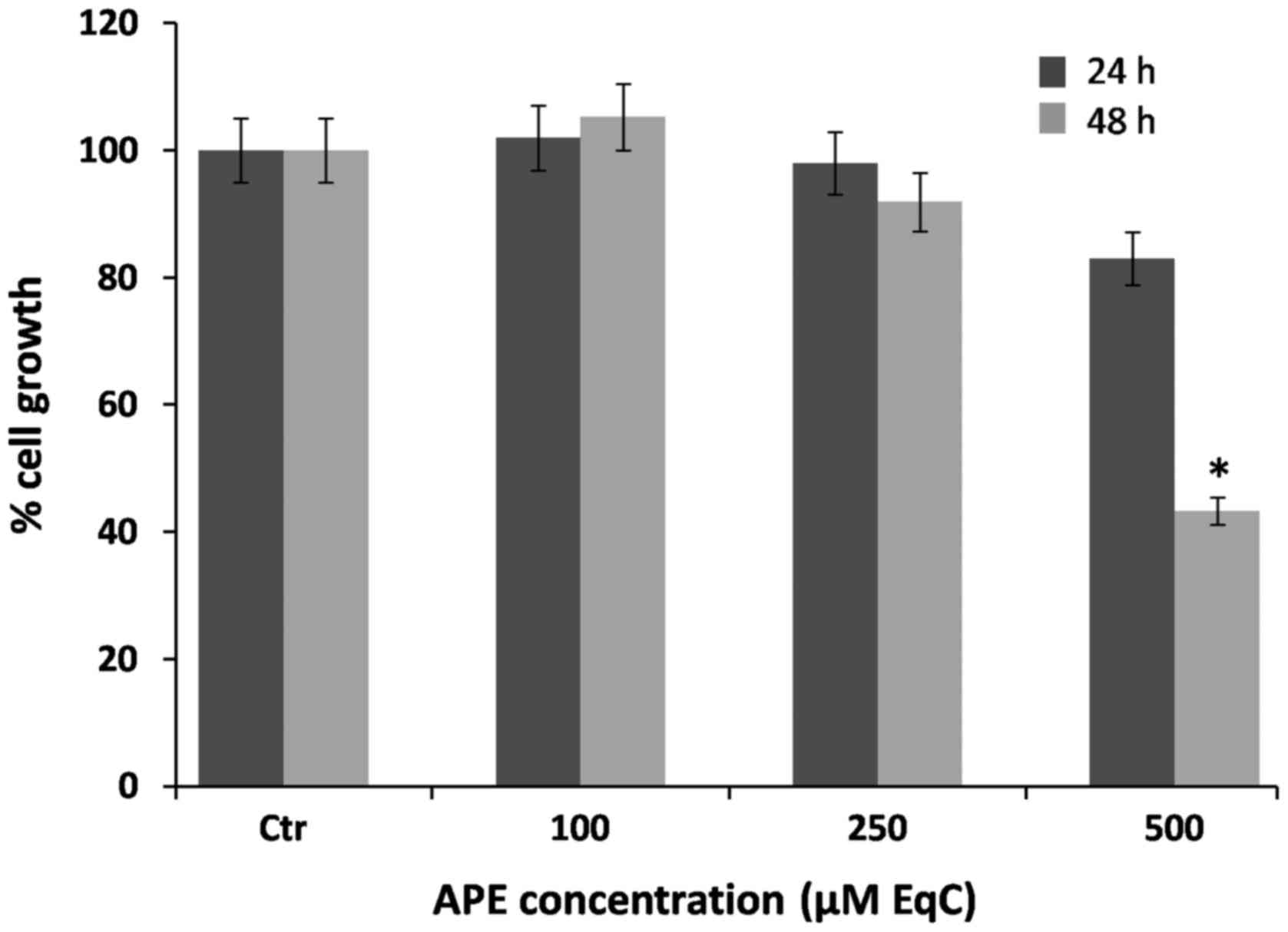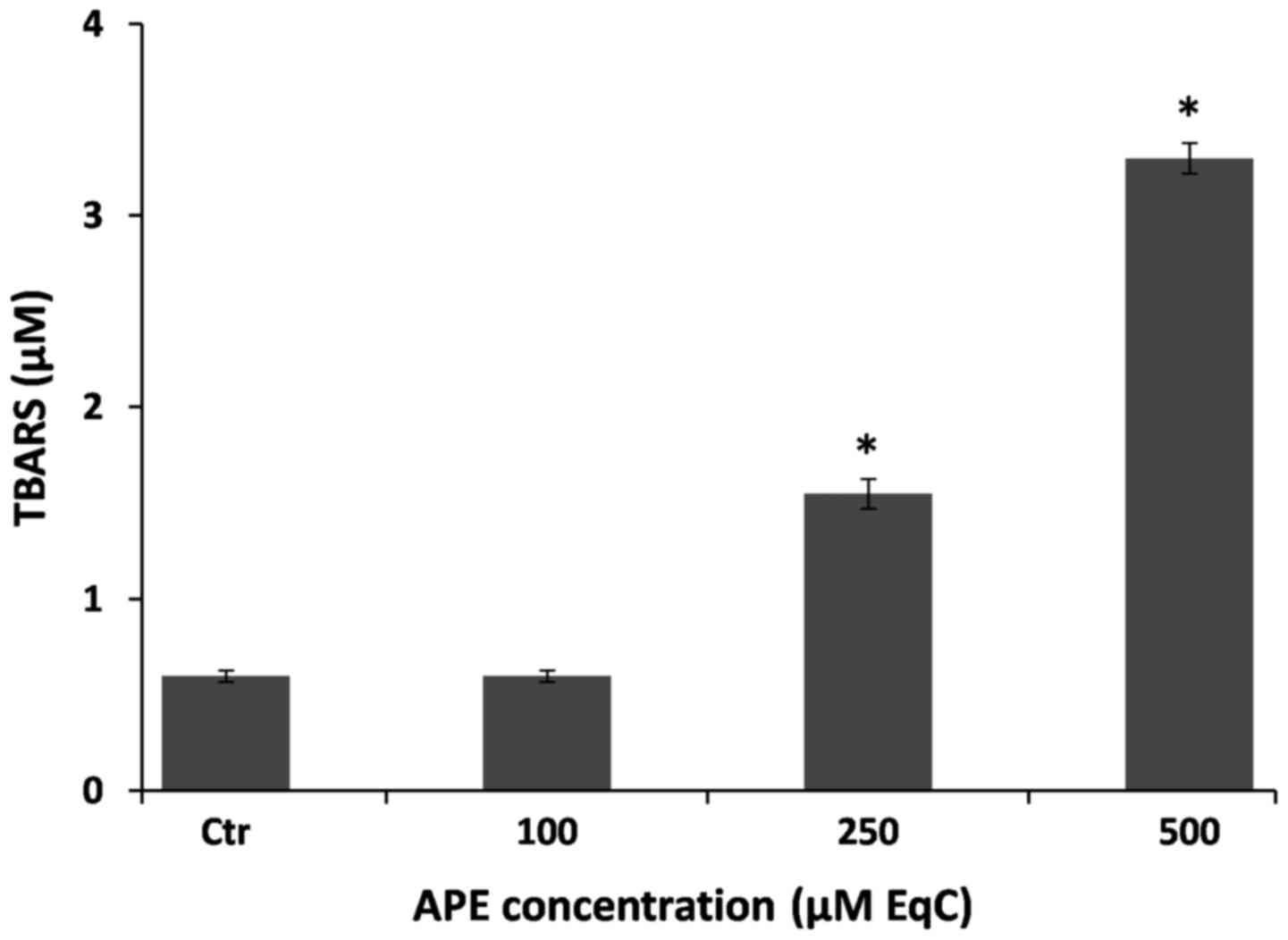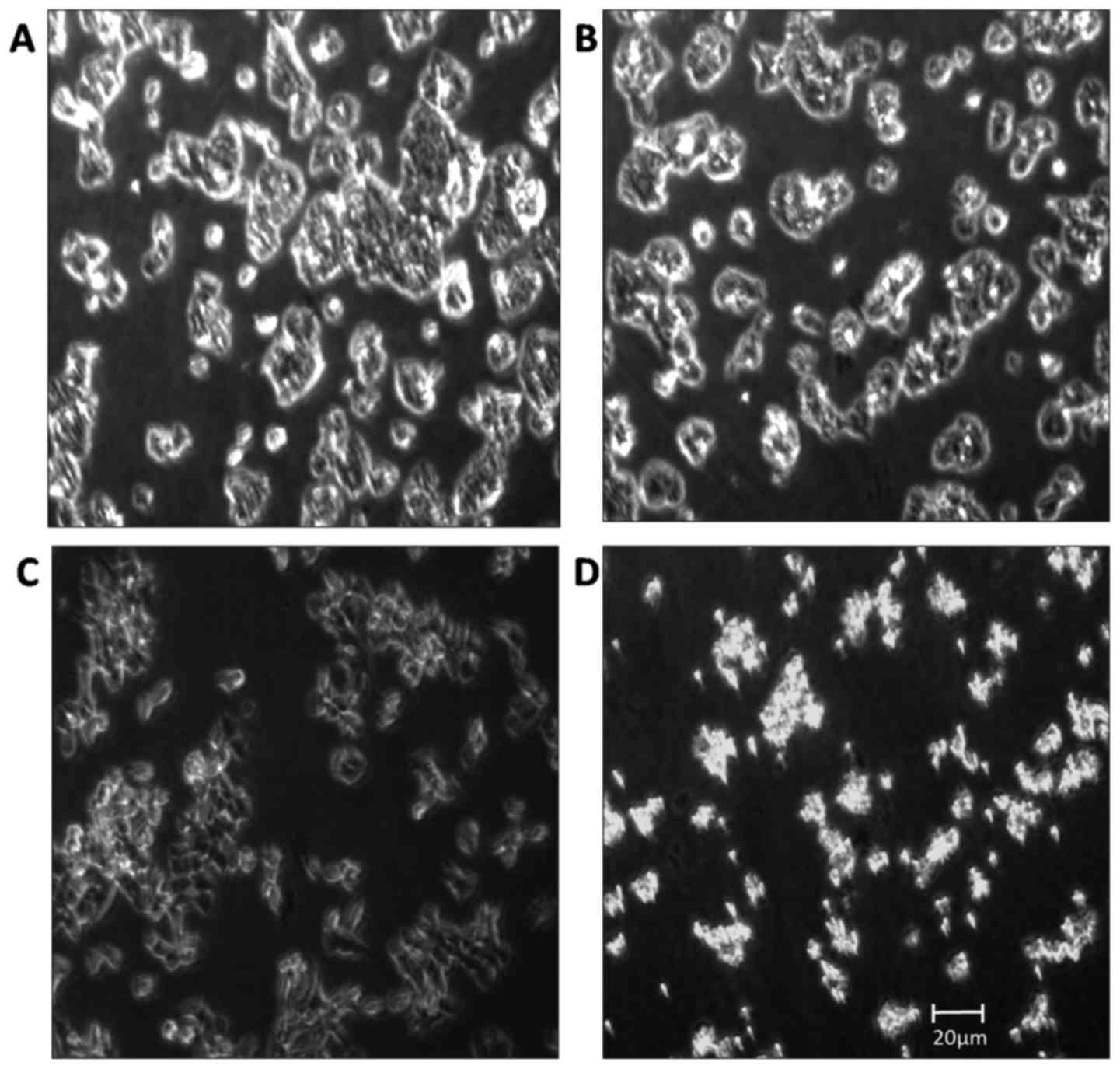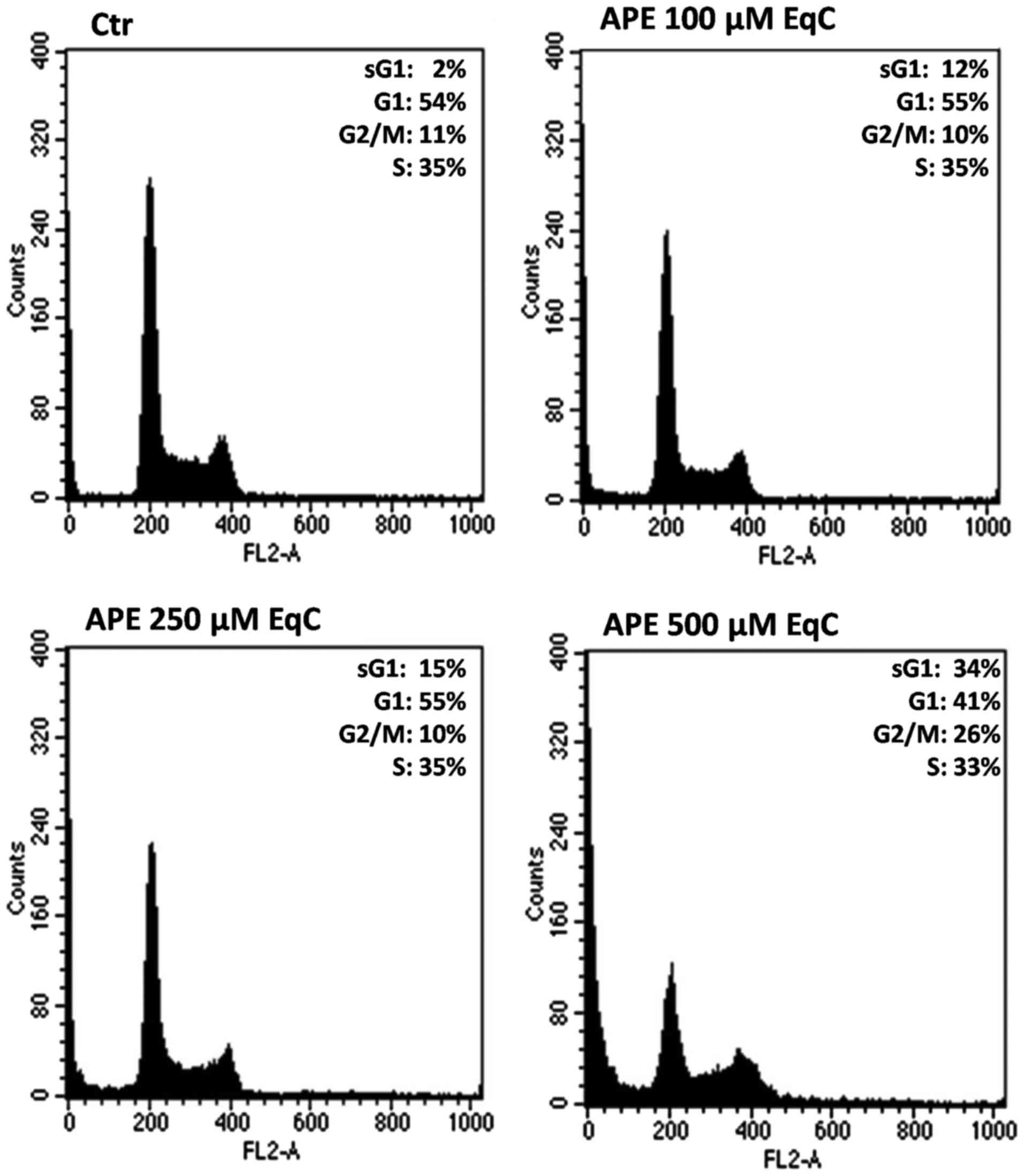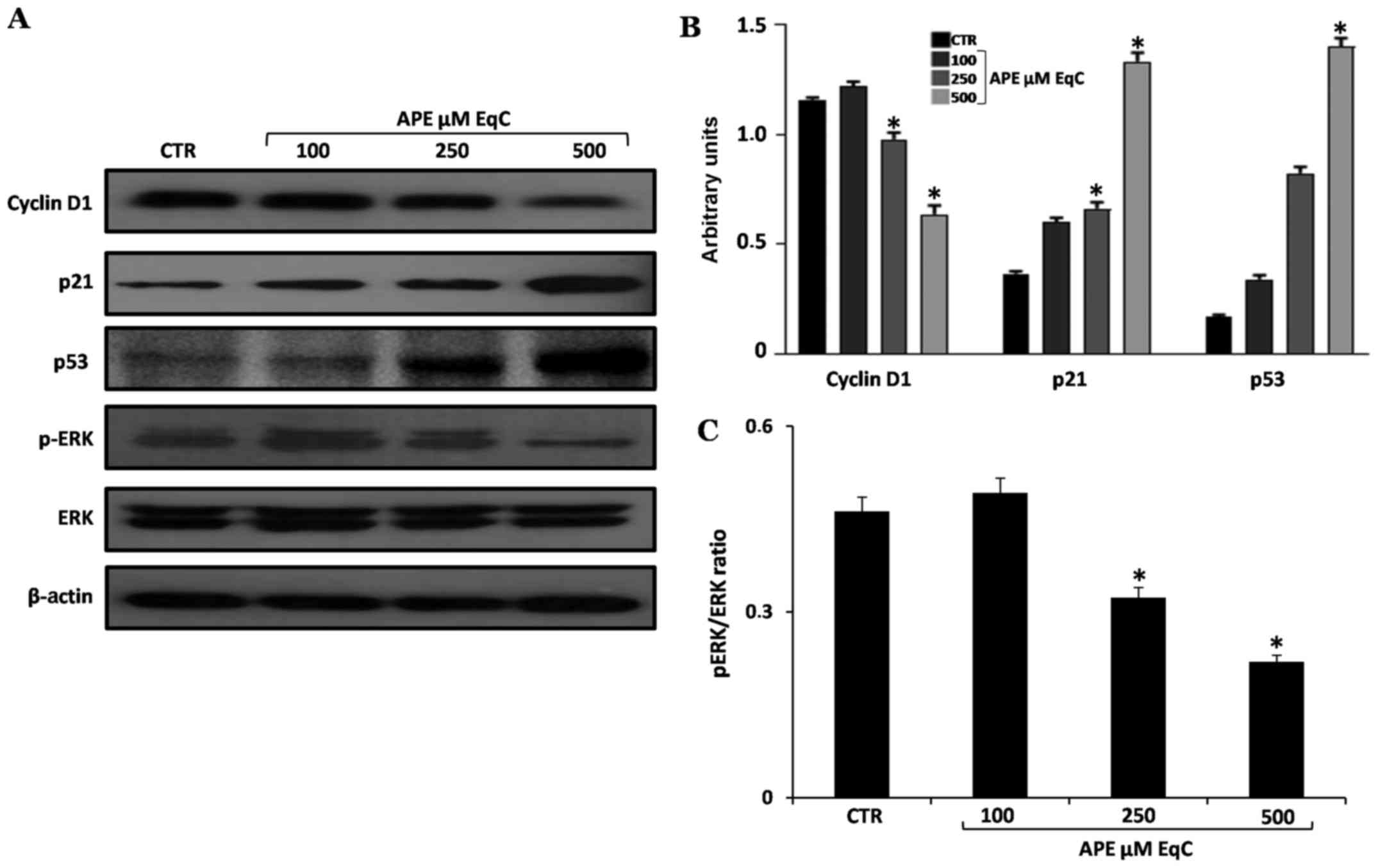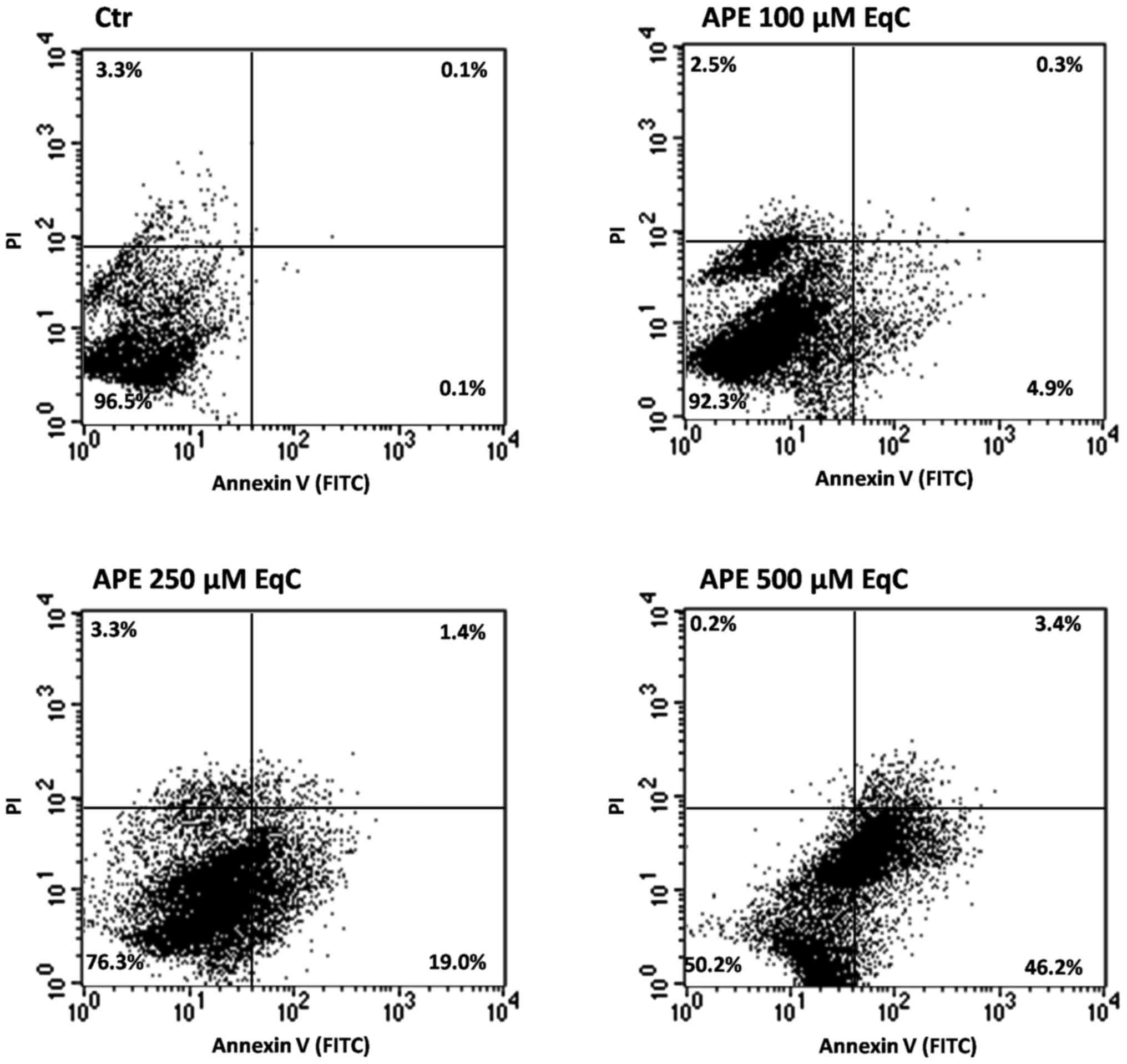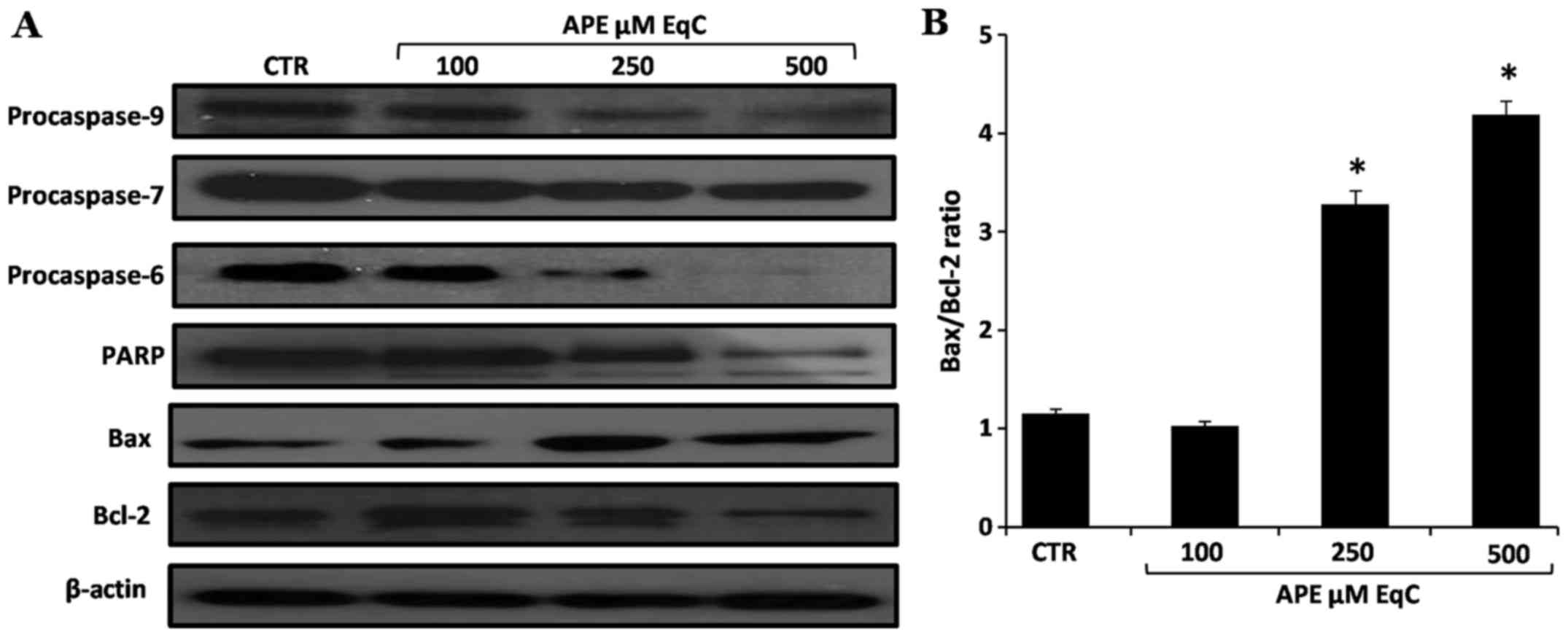|
1
|
Reczek CR and Chandel NS: The two faces of
reactive oxygen species in cancer. Annu Rev Cancer Biol. 1:79–98.
2017. View Article : Google Scholar
|
|
2
|
Wang P, Yang HL, Yang YJ, Wang L and Lee
SC: Overcome cancer cell drug resistance using natural products.
Evid Based Complement Alternat Med. 2015:7671362015. View Article : Google Scholar : PubMed/NCBI
|
|
3
|
Li L and Leung PS: Use of herbal medicines
and natural products: An alternative approach to overcoming the
apoptotic resistance of pancreatic cancer. Int J Biochem Cell Biol.
53:224–236. 2014. View Article : Google Scholar : PubMed/NCBI
|
|
4
|
Hemaiswarya S and Doble M: Potential
synergism of natural products in the treatment of cancer. Phytother
Res. 20:239–249. 2006. View
Article : Google Scholar : PubMed/NCBI
|
|
5
|
León-González AJ, Auger C and Schini-Kerth
VB: Pro-oxidant activity of polyphenols and its implication on
cancer chemo-prevention and chemotherapy. Biochem Pharmacol.
98:371–380. 2015. View Article : Google Scholar
|
|
6
|
Rengarajan T and Yaacob NS: The flavonoid
fisetin as an anticancer agent targeting the growth signaling
pathways. Eur J Pharmacol. 789:8–16. 2016. View Article : Google Scholar : PubMed/NCBI
|
|
7
|
Batra P and Sharma AK: Anti-cancer
potential of flavonoids: Recent trends and future perspectives. 3
Biotech. 3:439–459. 2013. View Article : Google Scholar : PubMed/NCBI
|
|
8
|
Khan HY, Zubair H, Ullah MF, Ahmad A and
Hadi SM: A prooxidant mechanism for the anticancer and
chemopreventive properties of plant polyphenols. Curr Drug Targets.
13:1738–1749. 2012. View Article : Google Scholar : PubMed/NCBI
|
|
9
|
Crozier A, Jaganath IB and Clifford MN:
Dietary phenolics: Chemistry, bioavailability and effects on
health. Nat Prod Rep. 26:1001–1043. 2009. View Article : Google Scholar : PubMed/NCBI
|
|
10
|
Vauzour D, Rodriguez-Mateos A, Corona G,
Oruna-Concha MJ and Spencer JP: Polyphenols and human health:
Prevention of disease and mechanisms of action. Nutrients.
2:1106–1131. 2010. View Article : Google Scholar : PubMed/NCBI
|
|
11
|
Boyer J and Liu RH: Apple phytochemicals
and their health benefits. Nutr J. 3:52004. View Article : Google Scholar : PubMed/NCBI
|
|
12
|
Kern M, Tjaden Z, Ngiewih Y, Puppel N,
Will F, Dietrich H, Pahlke G and Marko D: Inhibitors of the
epidermal growth factor receptor in apple juice extract. Mol Nutr
Food Res. 49:317–328. 2005. View Article : Google Scholar : PubMed/NCBI
|
|
13
|
Sun J, Chu YF, Wu X and Liu RH:
Antioxidant and anti-proliferative activities of common fruits. J
Agric Food Chem. 50:7449–7454. 2002. View Article : Google Scholar : PubMed/NCBI
|
|
14
|
Tow WW, Premier R, Jing H and Ajlouni S:
Antioxidant and antiproliferation effects of extractable and
nonextractable polyphenols isolated from apple waste using
different extraction methods. J Food Sci. 76:T163–T172. 2011.
View Article : Google Scholar
|
|
15
|
Lo Scalzo R, Testoni A and Genna A:
'Annurca' apple fruit, a southern Italy apple cultivar: Textural
properties and aroma composition. Food Chem. 73:333–343. 2001.
View Article : Google Scholar
|
|
16
|
Napolitano A, Cascone A, Graziani G,
Ferracane R, Scalfi L, Di Vaio C, Ritieni A and Fogliano V:
Influence of variety and storage on the polyphenol composition of
apple flesh. J Agric Food Chem. 52:6526–6531. 2004. View Article : Google Scholar : PubMed/NCBI
|
|
17
|
Tenore GC, Campiglia P, Stiuso P, Ritieni
A and Novellino E: Nutraceutical potential of polyphenolic
fractions from Annurca apple (M. pumila Miller cv Annurca). Food
Chem. 140:614–622. 2013. View Article : Google Scholar : PubMed/NCBI
|
|
18
|
Fini L, Piazzi G, Daoud Y, Selgrad M,
Maegawa S, Garcia M, Fogliano V, Romano M, Graziani G, Vitaglione
P, et al: Chemoprevention of intestinal polyps in
ApcMin/+ mice fed with western or balanced diets by
drinking Annurca apple polyphenol extract. Cancer Prev Res (Phila).
4:907–915. 2011. View Article : Google Scholar
|
|
19
|
Fini L, Selgrad M, Fogliano V, Graziani G,
Romano M, Hotchkiss E, Daoud YA, De Vol EB, Boland CR and
Ricciardiello L: Annurca apple polyphenols have potent
demethylating activity and can reactivate silenced tumor suppressor
genes in colorectal cancer cells. J Nutr. 137:2622–2628.
2007.PubMed/NCBI
|
|
20
|
D'Angelo S, La Porta R, Napolitano M,
Galletti P, Quagliuolo L and Boccellino M: Effect of Annurca apple
polyphenols on human HaCaT keratinocytes proliferation. J Med Food.
15:1024–1031. 2012. View Article : Google Scholar : PubMed/NCBI
|
|
21
|
Wang S, Bai L, Lu J, Liu L, Yang CY and
Sun H: Targeting inhibitors of apoptosis proteins (IAPs) for new
breast cancer therapeutics. J Mammary Gland Biol Neoplasia.
17:217–228. 2012. View Article : Google Scholar : PubMed/NCBI
|
|
22
|
Dou QP: Molecular mechanisms of green tea
polyphenols. Nutr Cancer. 61:827–835. 2009. View Article : Google Scholar
|
|
23
|
Singleton VL, Orthofer R and
Lamuela-Raventos RM: Analysis of total phenols and other oxidation
substrates and antioxidants by means of Folin-Ciocalteu reagent.
Methods Enzymol. 299:152–178. 1999. View Article : Google Scholar
|
|
24
|
D'Angelo S, Cimmino A, Raimo M, Salvatore
A, Zappia V and Galletti P: Effect of reddening-ripening on the
antioxidant activity of polyphenol extracts from cv. 'Annurca'
apple fruits. J Agric Food Chem. 55:9977–9985. 2007. View Article : Google Scholar : PubMed/NCBI
|
|
25
|
D'Angelo S and Sammartino D: Protective
effect of Annurca apple extract against oxidative damage in human
erythrocytes. Curr Nutr Food Sci. 11:248–256. 2015. View Article : Google Scholar
|
|
26
|
Vermes I, Haanen C, Steffens-Nakken H and
Reutelingsperger C: A novel assay for apoptosis. Flow cytometric
detection of phosphatidylserine expression on early apoptotic cells
using fluorescein labelled Annexin V. J Immunol Methods. 184:39–51.
1995. View Article : Google Scholar : PubMed/NCBI
|
|
27
|
Gago-Dominguez M, Jiang X and Castelao JE:
Lipid peroxidation, oxidative stress genes and dietary factors in
breast cancer protection: A hypothesis. Breast Cancer Res.
9:201–211. 2007. View Article : Google Scholar : PubMed/NCBI
|
|
28
|
Fantini M, Benvenuto M, Masuelli L,
Frajese GV, Tresoldi I, Modesti A and Bei R: In vitro and in vivo
antitumoral effects of combinations of polyphenols, or polyphenols
and anticancer drugs: Perspectives on cancer treatment. Int J Mol
Sci. 16:9236–9282. 2015. View Article : Google Scholar : PubMed/NCBI
|
|
29
|
Min NY, Kim JH, Choi JH, Liang W, Ko YJ,
Rhee S, Bang H, Ham SW, Park AJ and Lee KH: Selective death of
cancer cells by preferential induction of reactive oxygen species
in response to (−)-epigallocatechin-3-gallate. Biochem Biophys Res
Commun. 421:91–97. 2012. View Article : Google Scholar : PubMed/NCBI
|
|
30
|
Casanova F, Quarti J, da Costa DC, Ramos
CA, da Silva JL and Fialho E: Resveratrol chemosensitizes breast
cancer cells to melphalan by cell cycle arrest. J Cell Biochem.
113:2586–2596. 2012. View Article : Google Scholar : PubMed/NCBI
|
|
31
|
Lee HP, Li TM, Tsao JY, Fong YC and Tang
CH: Curcumin induces cell apoptosis in human chondrosarcoma through
extrinsic death receptor pathway. Int Immunopharmacol. 13:163–169.
2012. View Article : Google Scholar : PubMed/NCBI
|
|
32
|
Etienne-Selloum N, Dandache I, Sharif T,
Auger C and Schini-Kerth VB: Polyphenolic compounds targeting
p53-family tumor suppressors: current progress and challenges.
Future Aspects of Tumor Suppressor Gene. Cheng Y: InTech; pp.
129–166. 2013, https://doi.org/10.5772/56102.
|
|
33
|
Taylor WR and Stark GR: Regulation of the
G2/M transition by p53. Oncogene. 20:1803–1815. 2001. View Article : Google Scholar : PubMed/NCBI
|
|
34
|
Zhang X, Min KW, Wimalasena J and Baek SJ:
Cyclin D1 degradation and p21 induction contribute to growth
inhibition of colorectal cancer cells induced by
epigallocatechin-3-gallate. J Cancer Res Clin Oncol. 138:2051–2060.
2012. View Article : Google Scholar : PubMed/NCBI
|
|
35
|
Sherr CJ: D-type cyclins. Trends Biochem
Sci. 20:187–190. 1995. View Article : Google Scholar : PubMed/NCBI
|
|
36
|
Yang K, Hitomi M and Stacey DW: Variations
in cyclin D1 levels through the cell cycle determine the
proliferative fate of a cell. Cell Div. 1:322006. View Article : Google Scholar : PubMed/NCBI
|
|
37
|
Alao JP: The regulation of cyclin D1
degradation: Roles in cancer development and the potential for
therapeutic invention. Mol Cancer. 6:242007. View Article : Google Scholar : PubMed/NCBI
|
|
38
|
Cagnol S and Chambard JC: ERK and cell
death: Mechanisms of ERK-induced cell death - apoptosis, autophagy
and senescence. FEBS J. 277:2–21. 2010. View Article : Google Scholar
|
|
39
|
Chaparro M, González Moreno L,
Trapero-Marugán M, Medina J and Moreno-Otero R: Review article:
Pharmacological therapy for hepatocellular carcinoma with sorafenib
and other oral agents. Aliment Pharmacol Ther. 28:1269–1277. 2008.
View Article : Google Scholar : PubMed/NCBI
|
|
40
|
Briviba K, Pan L and Rechkemmer G: Red
wine polyphenols inhibit the growth of colon carcinoma cells and
modulate the activation pattern of mitogen-activated protein
kinases. J Nutr. 132:2814–2818. 2002.PubMed/NCBI
|
|
41
|
Granado-Serrano AB, Martín MA, Bravo L,
Goya L and Ramos S: Quercetin induces apoptosis via caspase
activation, regulation of Bcl-2, and inhibition of PI-3-kinase/Akt
and ERK pathways in a human hepatoma cell line (HepG2). J Nutr.
136:2715–2721. 2006.PubMed/NCBI
|
|
42
|
Hardwick JM and Soane L: Multiple
functions of BCL-2 family proteins. Cold Spring Harb Perspect Biol.
5:pii: a008722. 2013. View Article : Google Scholar : PubMed/NCBI
|
|
43
|
Babich H, Schuck AG, Weisburg JH and
Zuckerbraun HL: Research strategies in the study of the pro-oxidant
nature of polyphenol nutraceuticals. J Toxicol. 2011:4673052011.
View Article : Google Scholar : PubMed/NCBI
|
|
44
|
Trachootham D, Lu W, Ogasawara MA, Nilsa
RD and Huang P: Redox regulation of cell survival. Antioxid Redox
Signal. 10:1343–1374. 2008. View Article : Google Scholar : PubMed/NCBI
|
|
45
|
Burch PM and Heintz NH: Redox regulation
of cell-cycle re-entry: Cyclin D1 as a primary target for the
mitogenic effects of reactive oxygen and nitrogen species. Antioxid
Redox Signal. 7:741–751. 2005. View Article : Google Scholar : PubMed/NCBI
|
|
46
|
Fasanaro P, Magenta A, Zaccagnini G,
Cicchillitti L, Fucile S, Eusebi F, Biglioli P, Capogrossi MC and
Martelli F: Cyclin D1 degradation enhances endothelial cell
survival upon oxidative stress. FASEB J. 20:1242–1244. 2006.
View Article : Google Scholar : PubMed/NCBI
|
|
47
|
Budanov AV: The role of tumor suppressor
p53 in the antioxidant defense and metabolism. Subcell Biochem.
85:337–358. 2014. View Article : Google Scholar : PubMed/NCBI
|
|
48
|
Wu GS: The functional interactions between
the p53 and MAPK signaling pathways. Cancer Biol Ther. 3:156–161.
2004. View Article : Google Scholar : PubMed/NCBI
|















